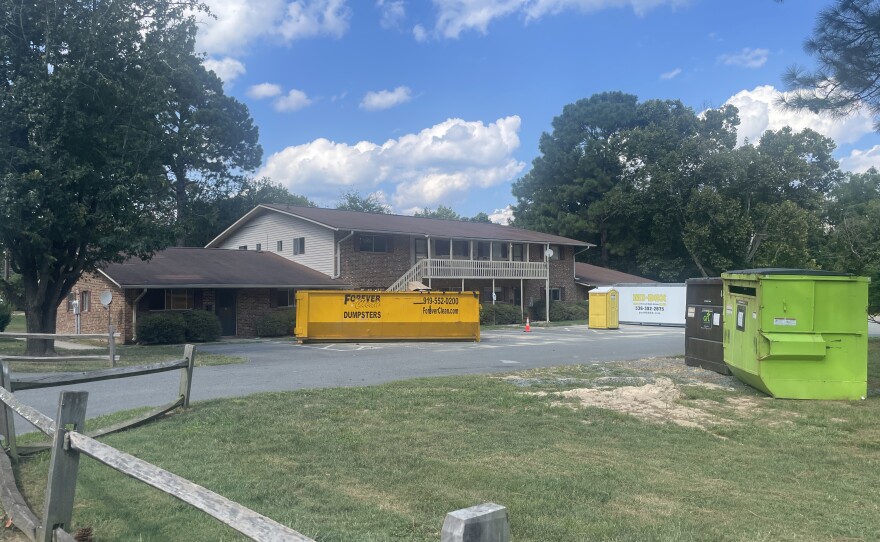Chapel Hill resident Heather Gibbs had lived at Camelot Village for only three months before severe flooding from Tropical Storm Chantal in July forced her to evacuate.
When water started creeping in from a corner of the apartment, she tried to move items onto high surfaces, but the water came in so quickly that she began to panic.
"I tried 9-1-1, but couldn't get through," Gibbs said. "I called my sister. I said, 'I'm sorry, I don't usually panic. But this water's over my rain boots.' I'm like, how can the water be over my rain boots inside?"
Gibbs, 48, has mobility issues and uses a walker. She recalled that the fire department had trouble entering the area, and eventually two neighbors came by to help pull her out. The neighbor upstairs allowed her to shelter there until the storm ended. But Gibbs remembered it was only after she moved upstairs that she started receiving flash flooding alerts on her phone. And then she saw boats coming around to rescue people trapped in their homes.
Gibbs noted that many Camelot Village residents are elderly and have disabilities.
"(Neighbors were) losing devices, like walkers, crutches," she said. "One guy lost his prosthetic leg. (There was) someone who was in a wheelchair, a man with dementia. These are the types of people that were living there."
After the storm, residents who evacuated Camelot Village and other households impacted by Chantal faced a tough road to finding housing. Gibbs moved in to a new apartment in September, but as of Nov. 17, Orange County officials reported that members of two households from Camelot Village are still staying at hotels.
Residents who evacuated the public housing complex at South Estes Extension are also still temporarily housed at hotels, and are expected to be able to return by early December, according to the town of Chapel Hill.
Camelot Village has long been in a floodprone area
Even before moving into Camelot Village, Gibbs experienced difficulty in finding affordable and accessible housing in Chapel Hill. She used to work as a postpartum doula until she suffered a stroke a few years ago, which led her to develop neurological and mobility issues, she said. Before Camelot Village, she spent months living at a homeless shelter, waiting for a ground floor-level apartment in Chapel Hill to become available. She qualified for a Section 8 voucher, but said there were long waitlists — some as long as two to four years — for public housing and other low-income housing options.
This past spring, the social worker at the shelter told Gibbs that a first floor unit at Camelot Village became available. At that point, she said she was eager to leave the shelter, having experienced bullying and other distressing behaviors from other shelter residents.
But she says the landlord downplayed the flooding risks. On the night of the storm, Camelot Village property manager Onyx Management President Barbara Duffy said the company sent out emails to owners, directly contacted several tenants and arranged for transportation to put more than three dozen residents up at hotels that night. But Gibbs said she didn't receive any of those notifications, leading to what was — for her — a horrifying experience.
More broadly, Camelot Village has a long history as a floodprone property, as Bolin Creek surrounds the apartment buildings. But mitigating that flooding and buying out properties requires a cooperation of the town, property owners and the Federal Emergency Management Agency, something that so far has not happened.
Confusion around hotel stays
Following Chantal, Gibbs stayed with her sister, who lives in another part of the Triangle, but could not stay for more than two weeks due to the terms of her sister's lease. Then, she stayed at a Comfort Inn in Durham, along with about two dozen Camelot Village residents.
Many of those residents had been sheltered at Smith Middle School in Chapel Hill before moving to the Comfort Inn. Some of the most vulnerable residents stayed with Triangle Mutual Aid volunteers, said Devin Gilgor, a longtime area resident. The mutual aid effort also helped pay for hotel rooms and Gilgor cooked dinner for residents for several weeks.
"I don't think (the town and county) had a very good system in place," Gilgor said. "Many of these people are lucky to be alive."
Gibbs recalled that the roughly six weeks she stayed at the Comfort Inn were confusing and distressing, and they sometimes checked with hotel staff to see how long their bookings would last. On Aug. 20, Triangle Tenant Union organized a press conference to bring attention to the displaced residents of Camelot Village. Funding for the hotel rooms came from Orange County, private donations, and, most recently, from N.C. Emergency Management, which is still covering costs of the few remaining hotel rooms.
Gibbs did end up moving into an apartment in Chapel Hill on Sept. 12, one that she submitted an application to back when she was living at the shelter. It's a better living situation than she had at Camelot Village, though she noted that the effort to make her current apartment available seemed rushed — not all of the electrical outlets are functional and black residue runs out of a bathtub faucet. But she chooses to stay in Chapel Hill because compared to other areas of the Triangle, the medical providers there better suit her needs.
"There is not enough housing for people of low income, (with) disabilities, fixed incomes, who are on social security," Gibbs said. "(Section 8 housing) are the only places we have to go because prices are so high, it exceeds our income."









